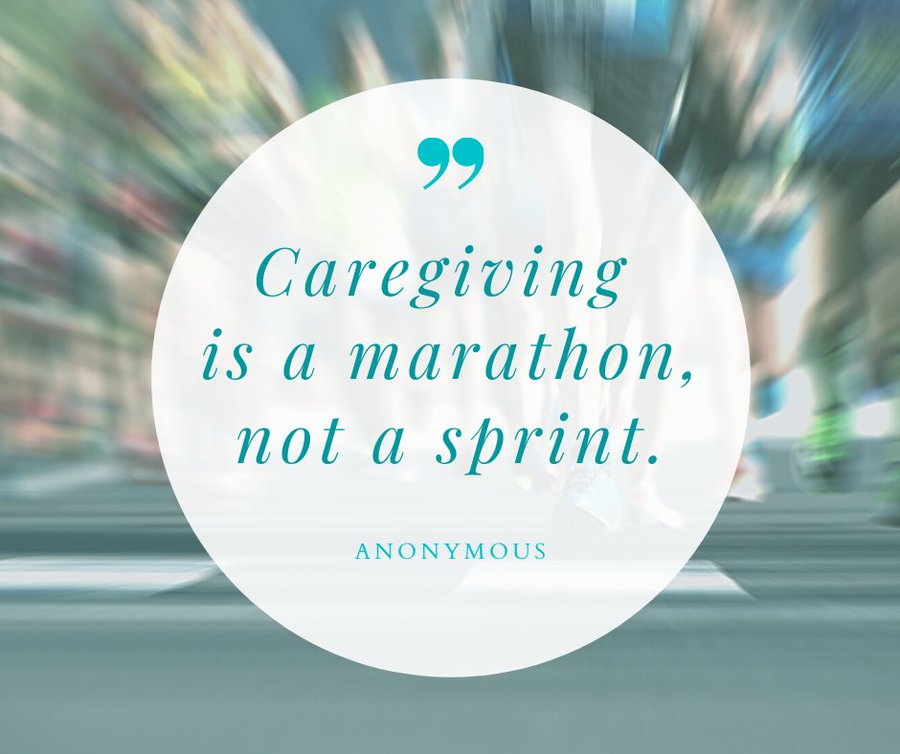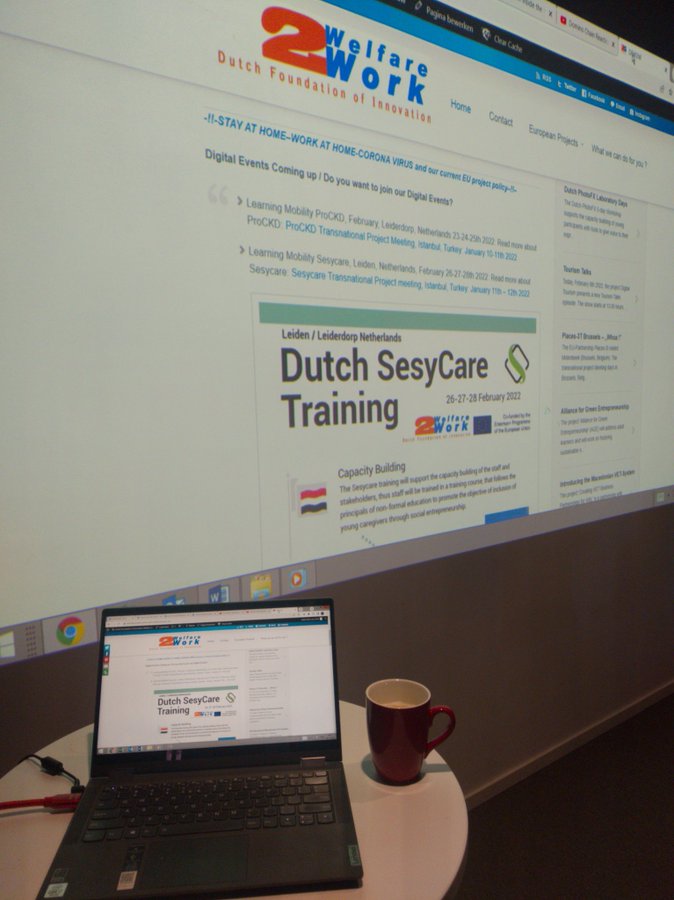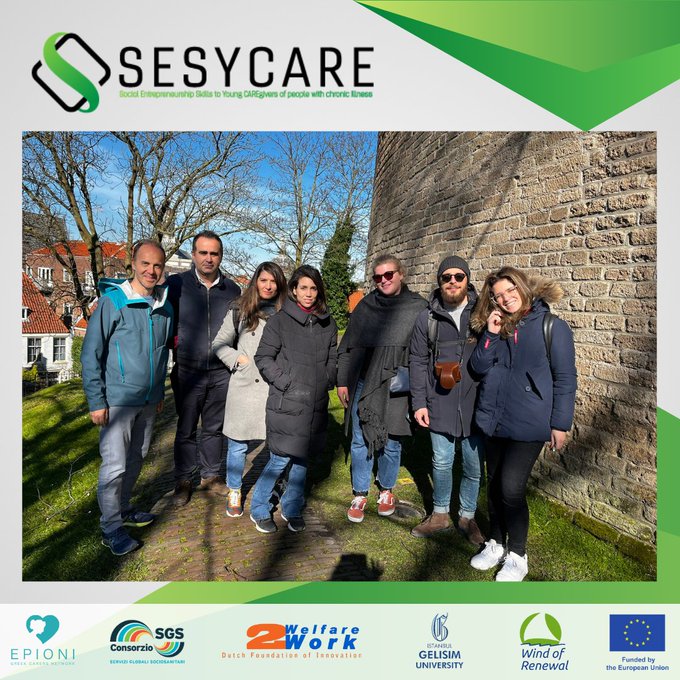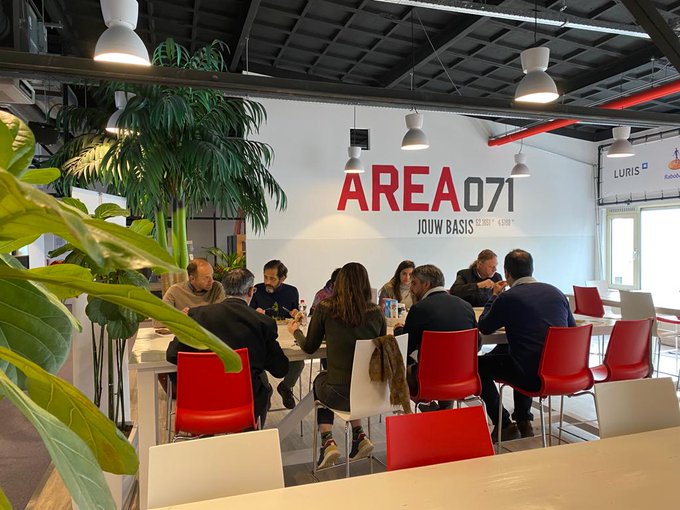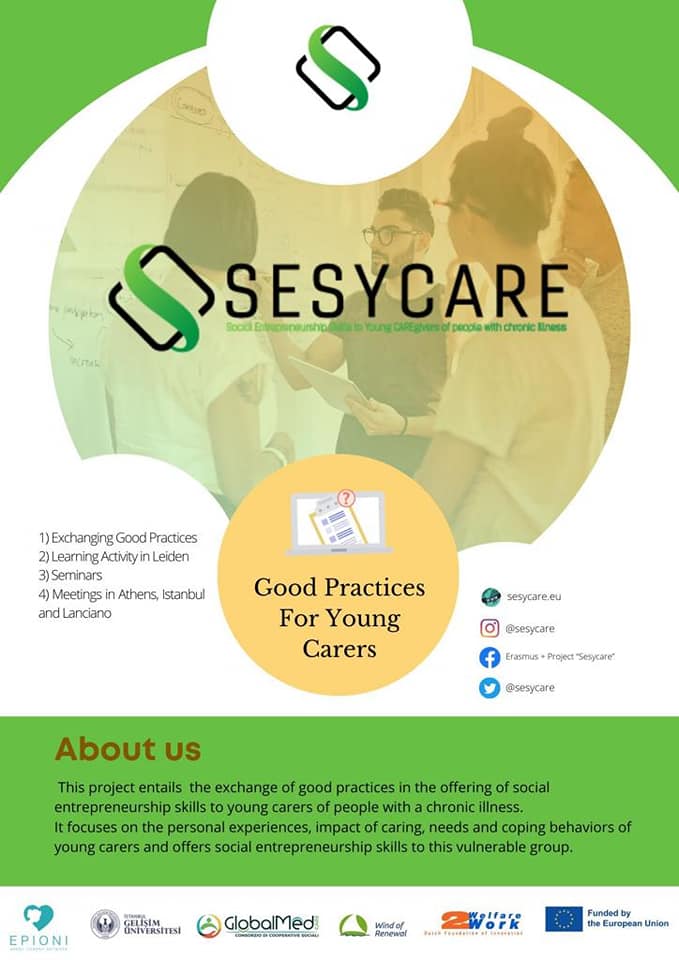
The project SESYCARE ‘‘Social entrepreneurship skills to young caregivers of people with chronic illness’’ focuses on the problems of young carers. Partners of the project are: the Greek Caregivers Network EPIONI (lead partner) and the Istanbul Gelişim University, SGS Consorzio, Stichting Dutch Foundation of Innovation Welfare 2 Work and Anemos Ananeosis / Wind of Renewal.
Funded by the European Union (Αριθμός Σύμβασης 2020-2-EL02-KA205-006146), the project focuses on the problems of young carers. So who are these young caregivers in our lives? The group we define as young caregivers consists of children or young people caring for sick or disabled family members. Young caregivers, like other adult caregivers in the family, take on heavy responsibilities and provide informal care support for sick or disabled individuals in the home. However, this responsibility can sometimes be difficult for them and they may need special support under such a situation.
The SESYCARE project aimed to make suggestions to young caregivers to improve their coping behaviors based on their life experiences and to transform their experiences and knowledge gained through the role of caregiver in the family into a social entrepreneurship skill.
Young carers are not generally counted among the disadvantaged groups. Also, it is ignored by the family. Young caregivers who provide care support to sick or disabled family members are affected psychologically and sociologically in the long run. Various studies, according to Eurocarers, have documented that many young people provide substantial care support to chronically ill members of their families. Young caregivers, who have to spend most of their time at home due to this heavy responsibility, unfortunately fall behind in their education or they show weakness and often cannot be included in social groups of their peers. At the same time, this can become a difficult situation to explain for young caregivers. Although they have good caring experience, they tend to hide the condition of the disabled person in their family from others. Because they don’t want to be described as a young caregiver. Young carers want to live a “normal life”!
Young caregivers who put the needs of their family members above their own want to lead a normal life. Therefore, young carers need professional support to enable them to recognize the real needs of their family members so that they can spend more time with themselves. Professional support for the sick or disabled person will help to make a more effective care plan, to make good time management for the other members of the family and to devote more personal time to themselves. In addition, such support will allow family members to feel mentally healthier. This means that young carers become more socialized, express themselves more clearly and focus better on the opportunities for their education. Can young carers turn their carer experience into a social enterprise experience?
Who is a social entrepreneur? Social entrepreneurs are people who have the potential to produce solutions for community-based problems. They are willing to take risks and efforts to create positive changes in society through their initiatives by following new practices. A social entrepreneur is not just concerned with pursuing profits, but building a business for greater social good. People who have sick or disabled people in their family approach the situation from a different perspective, based on their experiences and looking at community-based problems from a different perspective. Therefore, they are among the first to notice many problems and needed solutions. The experience of young carers from an early age certainly creates potential for solving social problems and this group deserves to be encouraged as social entrepreneurs.
The first meeting of the project was held in Athens with the participation of experts. The partnership met in Athens for the project kick-off meeting. Various experts were invited to the meeting, which was celebrated on September 23-24, 2021. On the first day of the meeting, experience and different cultures was shared by experts, accompanied by a conference attended by representatives from Greece, Belgium, Serbia, Italy, Slovenia, Croatia, the Netherlands and Turkey. The conference focused on the personal experiences, impact of care, conflicts and coping behaviors of young caregivers. In addition, two young caregivers were invited to share their experiences. These two young caregivers from the Netherlands and Sweden talked about their experiences and how they coped with their difficulties. During the conference, experts made scientific presentations on “Young carers and why social entrepreneurship is relevant to them”.
On the second day of the meeting, a webinar on “Care of Caregivers” was held. Stelios Kympouropoulos, Member of the European Parliament, Marietta Giannakou, Member of the Greek Parliament, and Mr. Grigoris Konstantellos, Mayor of the Vari-Voula-Vouliagmeni region, attended the webinar with their presentations. Marietta Giannakou underlined the need for carer associations to communicate with politicians, emphasizing the importance of advocating for informal carers. In addition, Stecy Yghemonos, who attended the meeting from Eurocarers, conveyed the work of this umbrella organization in the EU environment and the consequences of COVID-19 on caregivers at the EU level. Another participant, Kelly Panagiotopoulou, talked about the prevention of depression among caregivers, and Dimitrios Nikolsky, representative of the Greek Ministry of Labor and Social Affairs, detailed the Personal Assistant institution.
Noor Seghers from KU Leuven University talked about good practices supporting carers in Belgium. Finally, Mr. Christos Prapas, lecturer at the University of West Attica in Greece, highlighted the importance of supporting caregivers as an issue directly related to public and community health. Later in the meeting, presentations were made about the work of the partner organizations and the implementation strategies of the project.
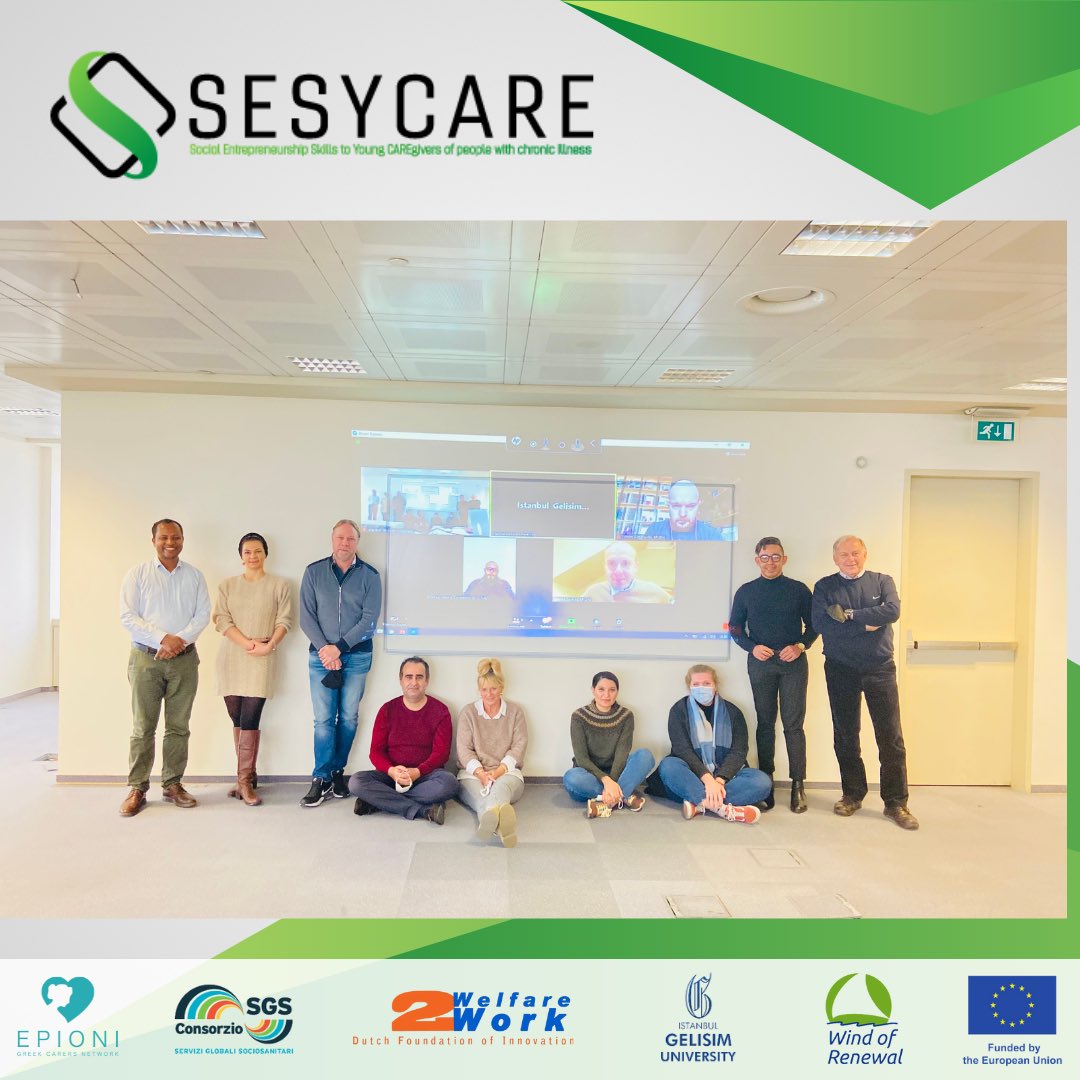
The partnership met in Istanbul for the second evaluation meeting. The second evaluation meeting of the project was held as a hybrid in Istanbul, hosted by Istanbul Gelişim University. The partnership, which met again on 11-12 January 2022, reviewed the strategies of the project and made various evaluations. In addition, during the meeting, presentations were made by experts invited by Istanbul Gelişim University. Dean of Students İbrahim Halil Yaşar introduced the functions of the Dean of Students at universities, and Erdem Ünal Elli, director of the Psychological Counseling and Guidance Center, introduced the functions of the Psychological Counseling and Guidance Center.
On the second day of the meeting, a focus group consisting of young caregivers was organized under the moderation of Istanbul Gelişim University. In the focus group, the experiences of a young caregiver with a disabled parent and another young caregiver whose sibling is disabled were shared. After the focus group, Dr. Aman Sado Elemo from Istanbul Gelisim University Psychology Department made a presentation on the psycho-social burden of young caregivers. Then again from the Department of Psychology, Dr. Esra Savaş talked about the family dynamics of a young caregiver.
The meeting, hosted by Istanbul Gelişim University and attended by some of the partners online, was evaluated efficiently despite the pandemic conditions. The project was enriched by the presentations of the experts.
The meeting in Leiden
On February 26-28, 2022 and hosted by the Stichting Dutch Foundation of Innovation Welfare 2 Work, a short-term staff training within the scope of the Sesycare project was held. Located in the Area071 incubation center in Leiderdorp, the host focused on the principles of non-formal education and the inclusion of young carers through social entrepreneurship through the workshops. The three-day training contributed to the capacity building of the key personnel involved in the project by the stakeholders. During the workshops, the step-by-step process of a young carer to become a social entrepreneur was described. The stages of a young carer’s readiness and motivation to become a social entrepreneur, concretely defining their goals and participating in a social entrepreneurship process were evaluated. In addition, the education and training processes applied in the field of social entrepreneurship were discussed.
On the second day of the training, the project partners visited the Area071 incubation center to inspect. Accompanied by the host institution, we had the opportunity to meet the businesses in Area071. Especially Mr. Bart Hoenen, co-founder of AREA071, shared his experiences working with young entrepreneurs and vulnerable groups. Companies located in the incubation center often work on innovations and technologies aimed at improving the well-being of society. This experience sharing and review visit was very useful in terms of seeing examples of social entrepreneurship.
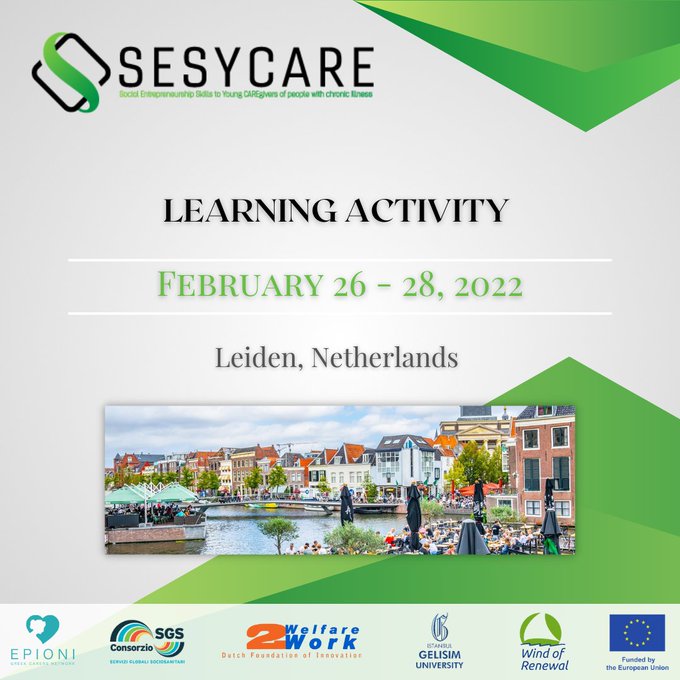
On the third day of the training, a presentation was made for young entrepreneurs by Andreas Stefanidis, the Greek President of the Entrepreneurship Academy. In the presentation where the Erasmus program was introduced, he explained how social entrepreneurs in the European Union can benefit from this program as the entrepreneurs of the future.
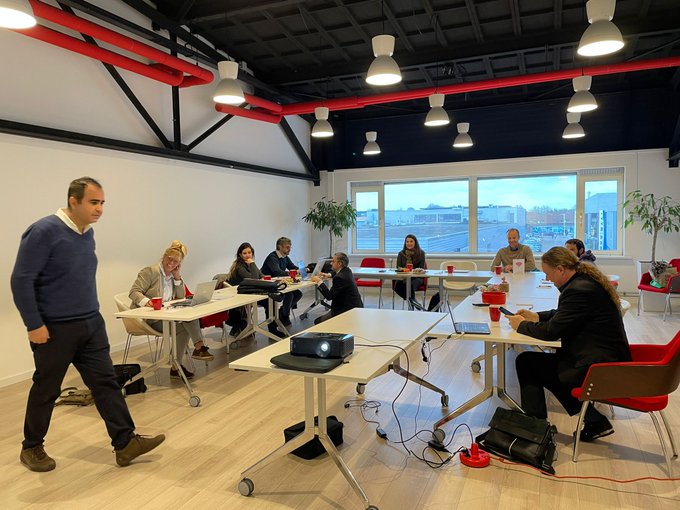
After that, participating in the online workshop from Istanbul Gelisim University Psychology Department, Dr. Aman Sado ELEMO, made a presentation on the psychological aspects of social entrepreneurship for the disabled or young caregivers.
With the Leiden workshops, an effective working environment has been created where we talk about how we can turn dreams into ideas and ideas into beginnings. In addition, the partners had the opportunity to participate in several cultural activities in the Dutch province of Leiden. The popular touristic areas of the region were visited with the host and the participants had a good time together.
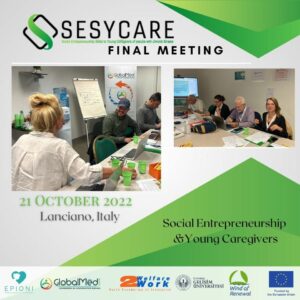 The meeting in Lanciano
The meeting in Lanciano
The partnership organized a visit to Lorenzo’s House in Italy as part of the Sesycare project. The final meeting of the project was held in Lanciano, Italy, on 20 and 21 October 2022, hosted by Consorzio SGS (renamed Consorzio di Cooperative sociali Global Med Care).
On the first day of the two-day meeting, they organized a visit to the Lorenzo House as part of good practice exchanges. Lorenzo’s House is a non-profit organization that is recognized as a social benefit entity. Lorenza’s house was dedicated by her family to Lorenzo Constantini, who died at the age of 20 from leukemia.
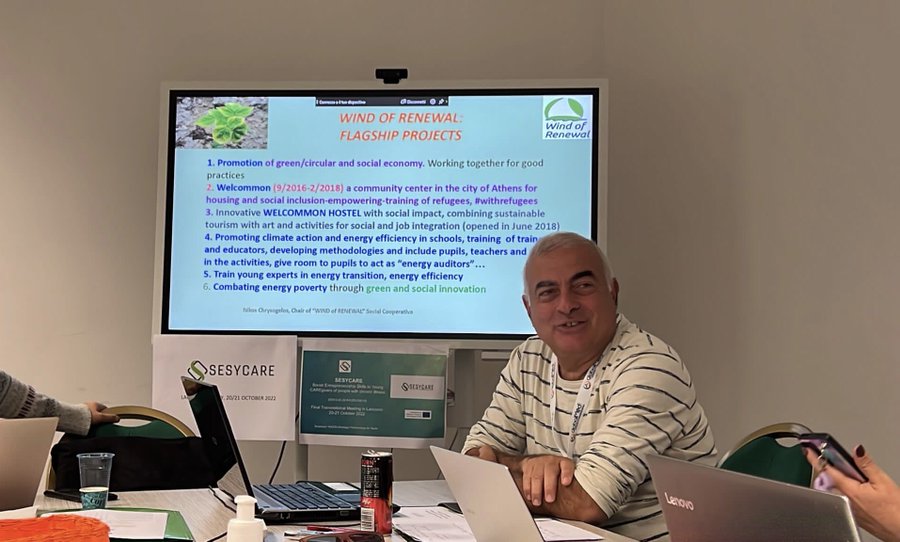
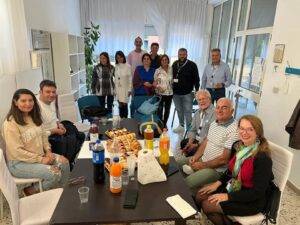 The organization also prepares special packages, baskets and products that can be sold on special occasions such as Christmas by contacting local producers in the region to provide the financial source to continue its activities.
The organization also prepares special packages, baskets and products that can be sold on special occasions such as Christmas by contacting local producers in the region to provide the financial source to continue its activities.
On the second day of the meeting, the sustainability strategy of the project On the second day of the meeting, the sustainability strategy of the project was reviewed and new project opportunities for the next period were discussed.
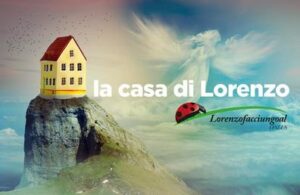 SESYCARE PROJECT
SESYCARE PROJECT
